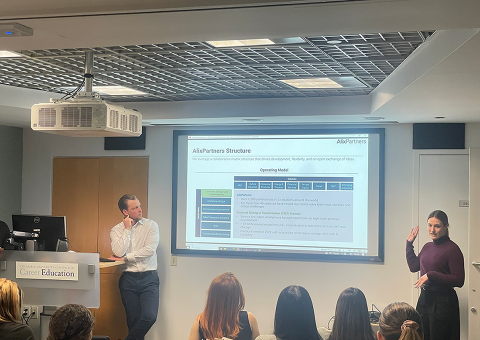On Wednesday, March 27, 2024, the Center for Career Education (CCE) hosted AlixPartners for a Design Your Next Steps workshop on Consulting Case Study. CCE was joined by three Columbia alums on the Corporate Strategy & Transformation (CS&T) team: Landon Baty (VP), Amber Swinarski (VP), and Marcus Ortiz (Consultant). They shared valuable insights on what it’s like to work at AlixPartners, a day in the life, as well as helpful advice on how to prepare for a case interview and how to go through a case.
ICYMI, here are some key takeaways from the workshop:
At AlixPartners, students can join as a generalist and work on impactful projects early in your career, across a wide range of industries. AlixPartners measures success through the increase in long-term value over time, as well as the longevity of client relationships.
Applications are open from July to mid September, and it’s important to be ready because it is a short timeframe. First round interviews are in late September, and additional assessments and final interviews go into early October. Offers are extended in mid October. Before the recruiting season gets really busy, it’s great to connect with the team via coffee chats during the summer and info sessions on campus during the fall, especially as you’ll have a chance to speak with people who will be the ones to interview you and work with you if you receive an offer.
During a case interview, interviewers are assessing: how you think, how you communicate your thought process, and how you do all of that under pressure. They do evaluate your math skills to some extent. There’s a joke that “consultant math is 80%”, meaning that you just need to have enough information to make a decision to act on. It is helpful to know Excel and Python, as most successful candidates have some knowledge or background of both. Overall, interviewers are looking at your ability to: problem solve, adapt, analyze data, and discover insights.
It’s helpful to treat a case interview like it’s a real case, you’re the consultant, and the interviewer is the client. Keep in mind that your framework is your only tool during the interview, so make sure you have it memorized so you can easily use it during the case. But also know that it’s important to be flexible and adaptable during the interview. Aim to have a two way conversation with your interviewer, sharing your thoughts aloud and asking questions, as well as asking for their perspective and opinions.
One approach for doing a case study:
Start by noting key facts, and circle or underline the question/problem.
Repeat the info back to the interviewer, and ask questions to get the additional information that’s necessary to move forward.
Write down your framework, and share your thought process out loud with the interviewer. Keep things interactive and allow them to engage with you so that it’s a two-way conversation.
As you continue on, keep structuring your answers and engaging with your interviewer. The interviewer is the timekeeper, so oftentimes they’ll let you know if you’re going down the wrong path.
Advice for preparing for a case interview
To gain industry knowledge, it is helpful to learn the basic terms and metrics (i.e. P&L statement, balance statement, EBIT), and get familiar with resources like The Wall Street Journal. But if you’re in the interview and you don’t know something, that’s ok — it’s better to ask instead of doing something completely wrong.
Tips for practicing case studies include: practicing for a few months instead of trying to cram it all in, and making sure to share resources and practice with other folks. Practicing with different people and working on cases in different industries will allow you to get helpful feedback from a number of different perspectives. Make sure to practice out loud. And remember to keep taking notes, evaluating and reflecting, and refining your style over time.
CCE Resources
Make an appointment with a career counselor for support with your job and internship search, or to discuss strategies for discerning whether an organization has a culture of diversity and inclusion. You can also stop by our Quick Questions drop-in hours, in-person and virtually, Monday through Friday from 2:00 pm — 4:00 pm. No appointment is necessary.
Visit our events page to check out our upcoming DYNS workshops, career fairs, and industry showcases! Design Your Next Steps (DYNS) is a series of CCE and employer workshops that will help you gain practical skills for engagement with employers and alumni, and guide you through the internship/job and graduate school search process.
For case interview prep and support, you can check out our premium resource Management consulted, which is free for students.
While we don’t provide case interviews at CCE, we do provide many resources and tips on general interview prep.


